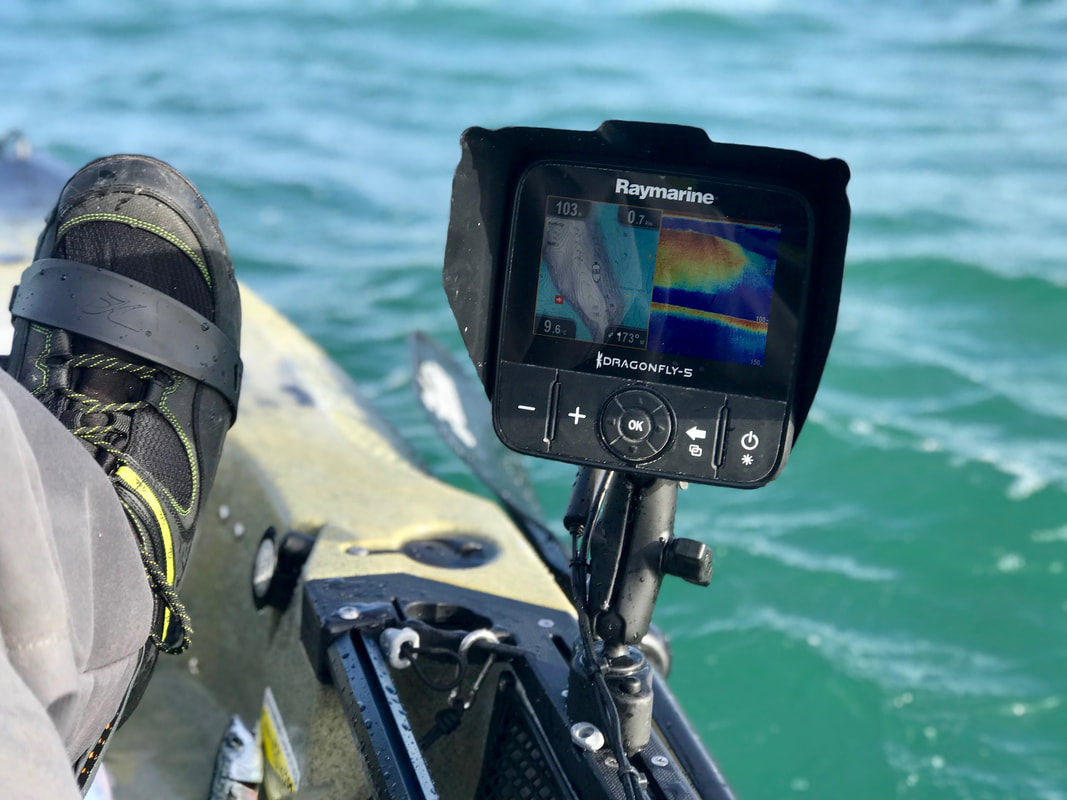Fishing from a kayak is fun. Using a fish finder can make it easier. But how does a fish finder work on a kayak? Let’s find out.

Credit: milespaddled.com
What is a Fish Finder?
A fish finder is a device. It helps find fish underwater. It uses sonar technology. Sonar stands for Sound Navigation and Ranging. It sends sound waves into the water. These waves bounce off objects. The device then shows images on a screen.
Parts of a Fish Finder
A fish finder has several parts. These include:
- Transducer: Sends and receives sound waves.
- Display: Shows images and data.
- Power Source: Provides energy to the device.
- Mounting Bracket: Holds the device in place.

Credit: www.kayakfishing.blog
How Does a Fish Finder Work?
The transducer sends sound waves into the water. These waves travel until they hit something. This could be fish, plants, or the bottom of the water. The waves then bounce back to the transducer. The device uses this information. It creates images on the display. This helps you see where the fish are.
Using a Fish Finder on a Kayak
Using a fish finder on a kayak is similar to using it on a boat. However, there are some differences. Here’s how to do it:
1. Choose The Right Fish Finder
Not all fish finders are the same. Some are better for kayaks. Look for a small, portable device. Make sure it is waterproof. You will be on the water.
2. Install The Transducer
The transducer is important. It needs to be in the water. On a kayak, you can install it in different ways. You can attach it to the hull. You can also use a suction cup. Some people use a portable transducer arm. Choose the method that works best for you.
3. Mount The Display
Next, mount the display. It should be easy to see. Some people use a mounting bracket. Others use a portable mount. Make sure it is secure.
4. Connect The Power Source
Your fish finder needs power. Most use batteries. Some kayaks have built-in power sources. Connect the device to the power source. Make sure it works.
5. Adjust The Settings
Turn on the fish finder. Adjust the settings. This includes the depth range and sensitivity. You may need to adjust them as you fish. Every water body is different.
Reading the Display
The display shows images and data. It can seem confusing at first. Here are some tips:
- Fish Icons: Some displays show fish as icons. This makes it easy to see.
- Arches: Fish may appear as arches. This happens when they pass through the sonar beam.
- Bottom: The bottom of the water will be a solid line. This helps you know how deep the water is.
Benefits of Using a Fish Finder on a Kayak
Using a fish finder has many benefits. Here are a few:
- Find Fish Faster: A fish finder shows where the fish are. This saves time.
- Learn About the Water: It shows the depth and structure of the water. This helps you understand the area better.
- Increase Success: Knowing where the fish are can lead to catching more fish.
Frequently Asked Questions
What Is A Fish Finder?
A fish finder is a device that uses sonar to detect fish underwater.
How Does A Fish Finder Work?
A fish finder sends sound waves underwater. These waves bounce back when they hit objects, showing fish locations.
Can You Use A Fish Finder On A Kayak?
Yes, many fish finders are designed for kayaks. They are portable and easy to mount.
What Features Should A Kayak Fish Finder Have?
Look for waterproof design, GPS, clear display, and portability. These features help in kayak fishing.
Conclusion
Now you know how a fish finder works on a kayak. It uses sonar technology. It helps you find fish. It is easy to install and use. It can make your fishing trips more successful. Happy fishing!
